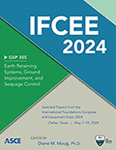Characterization of the Rheological Properties of Cement Grouts and Bentonite Drilling Muds with and without Saltwater at Two Temperatures Using Vipulanandan Models
Publication: IFCEE 2024
ABSTRACT
Cement grouts are used for installing pipes and wells, repairing infrastructure, treating and stabilizing soils and rocks, and also treating contaminated soils. Drilling muds are used in installing various deep foundations, pipes, tunnels, drilling boreholes, and in horizontal direction drillings even along the coastal regions. In this study, cement grouts with water-to-cement ratios of 1.0 and 1.5 were tested with and without 3.5% salt water. Also, drilling muds with bentonite clay content of 4% and 6% were tested. Also, the tests were performed at 25°C and 75°C. Based on the electrical impedance-frequency response, electrical resistivity was identified as the critical material property to monitor using the Vipulanandan impedance model for the cement grouts and the bentonite clay drilling muds. Immediately after mixing the resistivity of cement grouts with water-to-cement ratio of 1.0 and 1.5 were 1.42 and 1.60 Ωm, respectively, and the salt water and temperature reduced the initial resistivity. The initial resistivity of the drilling muds with 4% and 6% bentonite were 5.5 and 4.5 Ωm, respectively. Rheological tests showed that both fluids were non-Newtonian fluids and were shear thinning. The cement grouts’ yield stresses were higher than the yield stresses of the drilling muds. Salt water and higher temperature modified the rheological properties of the cement grouts and drilling muds. Vipulanandan rheological model was used to model the behaviors, and the maximum shear stress tolerance (new parameter) for the cement grouts were higher than the drilling muds. Also, the maximum shear stress tolerance of the drilling mud is an indicator of borehole cleaning (removing mud filtercakes) and also the potential for formation erosion. Vipulanandan rheological model predicted the cement grouts and drilling muds rheological behaviors very well based on the root mean square error (RMSE) and coefficient of variation statistical parameters.
Get full access to this chapter
View all available purchase options and get full access to this chapter.
REFERENCES
Afolabi, R., Yusuf, E., Okonji, C., and Nwobodo, S. (2019). “Predictive Analytics for the Vipulanandan Rheological Model and its Correlative Effect for Nanoparticle Modification of Drilling Mud,” Journal of Petroleum Science and Engineering, https://doi.org/10.1016/j.petrol.2019.106377.
Brusseau, M. L. (2019). Soil and groundwater remediation. In Environmental and pollution science (pp. 329–354). Academic Press.
Fan, J., Wang, D., and Qian, D. (2018). Soil-cement mixture properties and design considerations for reinforced excavation. Journal of Rock Mechanics and Geotechnical Engineering, 10(4), 791–797.
Polder, R. B. (2001). Test methods for on site measurement of resistivity of concrete—a RILEM TC-154 technical recommendation. Construction and building materials, 15(2-3), 125–131.
Shareef, A. H., Al-Neami, M. A., and Rahil, F. H. (2023). Some of The Field and Laboratory Studies on Grouting Properties for Weak Soils: A Review. International Journal of Intelligent Systems and Applications in Engineering, 11(5s), 131–141.
Tao, C., Kutchko, B. G., Rosenbaum, E., and Massoudi, M. (2020). A review of rheological modeling of cement slurry in oil well applications. Energies, 13(3), 570.
Tchameni, A. P., Zhao, L., Ribeiro, J. X. F., and Li, T. (2019). Evaluating the thermal effect on the rheological properties of waste vegetable oil biodiesel modified bentonite drilling muds using Vipulanandan model, “High Temperatures High Pressures Journal (HTHP), Volume 48, Issue: 3 Pages: 207–232.
Vipulanandan, C., and Mohammed, A. S. (2014a). Hyperbolic Rheological Model with Shear Stress Limit for Acrylamide polymer Modified Bentonite Drilling Muds, Journal of Petroleum Science and Engineering, Vol. 122, pp.38–47.
Vipulanandan, C., Heidari, M., Qu, Q., Farzam, H., and Pappas, J. M. (2014b). Behavior of piezoresistive smart cement contaminated with oil based drilling mud. Offshore Technology Conference (OTC) OTC-25200-MS.
Vipulanandan, C., Mohammed, A., and Samuel, R. G. (2017). Smart bentonite drilling muds modified with iron oxide nanoparticles and characterized based on the electrical resistivity and rheological properties with varying magnetic field strengths and temperatures. Offshore Technology Conference (OTC), OTC-27626-MS,.
Vipulanandan, C., Mohammed, A., and Samuel, R. G. (2018). Fluid loss control in smart bentonite drilling mud modified with nanoclay and quantified with Vipulanandan fluid loss model. Offshore Technology Conference (OTC), OTC-28974-MS.
Vipulanandan, C. (2021). Smart Cement: Development, Testing, Modeling and Real-Time Monitoring, Taylor and Francis Group-CRC Press, London, U.K. 440 pp.
Information & Authors
Information
Published In
History
Published online: May 3, 2024
ASCE Technical Topics:
- Cement
- Concrete
- Construction engineering
- Construction methods
- Drilling
- Engineering materials (by type)
- Geomechanics
- Geotechnical engineering
- Grouting
- Materials characterization
- Materials engineering
- Mud
- Rheology
- Salt water
- Shear stress
- Soil mechanics
- Soils (by type)
- Stress (by type)
- Structural analysis
- Structural engineering
- Water (by type)
- Water and water resources
- Water management
Authors
Metrics & Citations
Metrics
Citations
Download citation
If you have the appropriate software installed, you can download article citation data to the citation manager of your choice. Simply select your manager software from the list below and click Download.
